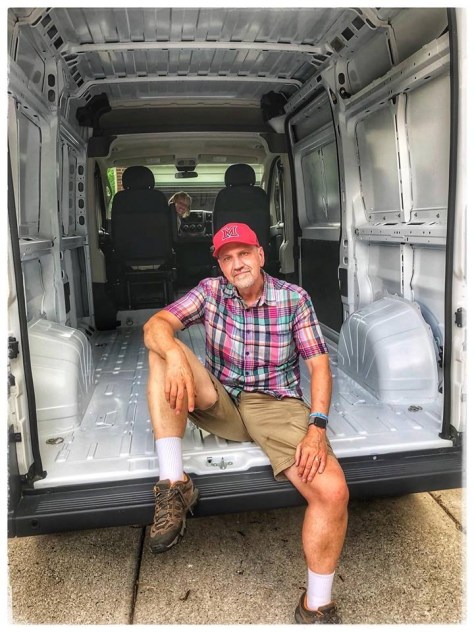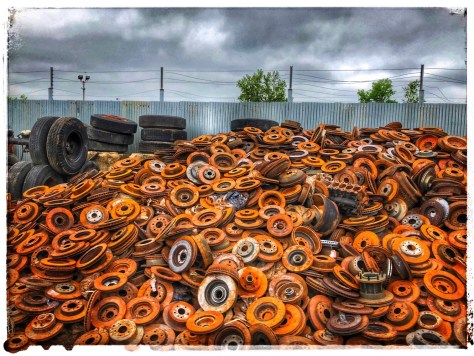Facing Mr. Kustom
Seven AM and I’m back from my morning walk. One-third cup quick cook oatmeal, two-thirds cup water, microwave for two minutes. Some mixed nuts, a few dried cranberries stirred in; I’m eating breakfast, and I’m feeling anxious.
I’m not usually an anxious person, but I do have a distaste for the unknown. I also have a dislike for the over-stimulation that driving to Chicago during a Monday rush hour brings.
Seven thirty and it is time to get into my Promaster. Gigantic and white, my wife refers to him as the “White Whale.” I have named him Albus, as a nod to the imaginary headmaster of Hogwarts who transformed the lives of others through magic.
I’m not suggesting that my work van is magical, but with some effort, it will be transformed from a bare truck into a camper-van that is capable of taking me to magical places. However, for this magic to happen, I will first need to stretch my personal comfort level.
To be honest, I still not used to driving Albus. He is enormous, and a master of blind spots. His two large mirrors help, but I’m still getting used to them. The thought of facing road construction traffic as I steer him is the source of my anxiety.
I pull myself up into his cabin, and I strap on my seatbelt. I dial in Google maps, paste in Mr. Kustom’s address, hit “start.” Soon I’m on I-88, then I-294, then I-90. I cling to the right lane as I drive. My sweet Google Assistant’s voice guides me but doesn’t lower my anxiety. I glance at the clock on the dashboard, and it is now 8:25. My appointment is at 9 AM. Despite padding my travel time with an extra 30 minutes, it looks like I may be late. “You can’t change traffic Mike, you need to accept where you are and let go,” I tell myself. Traffic chugs along, and soon I’m on Irving Park Road. I find a spot on the street, and wait for the store to open. I have 5 minutes to spare.
Now inside the store, my anxiety lessened, I find a spot among the three waiting chairs which seem out-of-place as they are awkwardly planted in the main showroom; I sit, knowing that the job will take 9 or more hours.
———————-
I have already finished a graphic novel on Joel Kupperman, of Quiz Kid’s fame, lent to me by Julie, I found it both a fun and interesting read. I now write, more to fill time than anything else. Albus is getting windows put in, two on his rear doors, and one on his sliding door. The salesman suggested adding an additional window on the driver’s side panel, but I’m already at my financial limit. The windows will make Albus more drivable, and add light to his interior when he becomes a camper. The windows are necessary, which is why I drove to Chicago, and why I’m patiently sitting as I listen to reggae music blaring over the store’s music system. Today is the beginning of his transformation. Tomorrow, he will have a hitch installed. In about two weeks I’ll drive to Colorado by myself to have Wayfarer vans install a modular camper interior that will include a floor, walls, ceiling, bed, and a kitchen. I’m looking at the Colorado trip as an adventure, but I’m only allowing myself a few days to get there and back, which adds time-stress to the mix.
After the Colorado trip, he will become a useable camper, but there is still more to do. A roof fan, though the wall power port, swivel seats, the list goes on. I’ll tackle these jobs with the help of my friend, Tom. Having a knowledgeable person to brainstorm with definitely helps me feel more comfortable and less anxious.
The goal is to make Albus a good camper by the end of August, but he won’t be completed until fall. There are many steps ahead.
Anything and everything can be a learning lesson. Today’s lesson is that sometimes you have to go through unpleasant steps to achieve the desired goal. I know that the windows will be put in and by tomorrow I’ll be on to my next project. The discomfort that I am experiencing today will soon be forgotten.
In my life, I have had many “no pain, no gain” experience. One of the reasons that I believe that I have been successful is that I have an excellent ability to do a cost analysis when it comes to the task at hand. I’m willing to expend substantial effort and to experience significant discomfort if I feel that the outcome is worth it. Conversely, I am unwilling to put out small effort and slight discomfort if I think that the desired result is unlikely. I’m also persistent, and very consistent. I used to think that everyone felt and functioned as I do, but I know now that this is not the case.
Most people want a good life, but they don’t want to expend the effort or experience the discomfort necessary to achieve that outcome. Do you want financial security? Spend less, and put more money in the bank. Feel that you are working beneath your intelligence level? Go back to school, retrain, or look for a better opportunity. Miserable because you are dealing with something that is out of your control? Accept it, or leave the person/situation.
I understand that some of you may be muttering, “Easy for him to talk, he’s a doctor.” Yes, that is true, but the way that I became a physician was by following the above principles. I come from a blue-collar background and didn’t have the opportunities that others had. However, I can be as tenacious as a bulldog when I need to be. We can’t always have everything that we want. In fact, sometimes we have to give up things that we do want to obtain something that we want more. That is life.
As an aside, I believe that you can accomplish goals while still being kind and generous to others. I find no joy in hurting or putting down someone.
Dear reader, It is easy to blame life, others, or God for not having what you think you deserve. The “Secret to Success” is that there is no secret. The sourness of a distasteful task is quickly remedied by the sweetness of a goal achieved.
 Before
Before  Before
Before  New side window
New side window  New windows.
New windows.



 Beautiful Portland
Beautiful Portland  Powell’s bookstore, the world’s largest.
Powell’s bookstore, the world’s largest.  Fantastic Blue Star donuts.
Fantastic Blue Star donuts.  The Oregon coast.
The Oregon coast.  Crater Lake obscured by smoke.
Crater Lake obscured by smoke.  Beautiful Trillion Lake.
Beautiful Trillion Lake.  On yet another hike.
On yet another hike.





















